Everyday Skincare: Best Natural Cleansers for Clear, Healthy Skin
Introduction
- Why Cleansing is the Foundation of Skincare
- Cleaning is the foundation of every skincare regimen, according to dermatologists and skincare specialists around the world.
- If you don’t thoroughly cleanse your skin, no matter how many serums, creams, or treatments you buy, they won’t work as well as they could.
- Best Natural Cleanser for Everyday Use Dust, perspiration, excess oil, pollutants, and even germs are among the impurities that accumulate on your skin throughout the day. Additionally, it sheds dead skin cells at night, which can block pores and cause breakouts if ignored.
- The American Academy of Dermatology states that regular, mild washing promotes the health of the skin barrier and helps avoid diseases like irritation, blackheads, and acne.
- A clear canvas guarantees better absorption of the active elements in your skincare products, such as retinol, hyaluronic acid, or vitamin C.

- Cleaning is more than simply rinsing away dirt, according to experts. It involves preserving the slightly acidic pH level (approximately 4.7–5.5) that inhibits dangerous bacteria and balancing the skin’s natural microbiota.
- This equilibrium can be upset by excessive cleaning or the use of harsh, chemical-laden cleaners, which can result in dryness, sensitivity, or an increase in oil production.
- Cleaning is essentially the same as making the soil ready for seeding.
- Without it, your skincare products’ powerful nutrients won’t penetrate or function as intended.
- The Shift Towards Natural and Gentle Alternatives
- Customers have been moving away from harsh cleaners and toward gentler, more natural options in recent years.
- Sulfates, artificial perfumes, and alcohol-based cleansers can deplete the skin’s protective oils, making it more susceptible to irritation, according to an increasing amount of studies.
- Plant-based, toxin-free, and environmentally friendly formulations have become more popular as a result.
- This tendency is supported by market data: Grand View Research surveys indicate that rising awareness of clean beauty will propel a large growth in the global natural skincare industry.
- Nowadays, consumers are paying closer attention to labels and choose natural ingredients over artificial foaming agents, such as oat extracts, rose water, chamomile, and aloe vera.
- Dermatologists frequently suggest gentle, moisturizing cleansers for people with sensitive or acne-prone skin from an authority perspective.
- Glycerin and natural oils (coconut, almond, or jojoba) are among the ingredients that effectively cleanse while hydrating.
- With the support of ancient Ayurvedic methods, herbal substitutes like neem, turmeric, and sandalwood have also become more popular because of their calming and antibacterial properties.
- This change has also been driven by the need for transparency.
- In addition to finding what works, today’s conscientious customer also looks for products that support ethical sourcing and sustainability.
- Packaging that is cruelty-free, vegan, and environmentally friendly increases brand loyalty and confidence.
2. What Makes a Cleanser “Natural”?
- Ingredients to Look for in Natural Cleansers
- In skincare, the term “natural” frequently arouses interest and occasionally perplexity. Generally speaking, a natural cleanser is one that substitutes mild synthetic chemicals with plant-derived, mineral-based, or biocompatible substances. Effective cleansing, skin barrier nourishment, and avoiding irritation are the objectives.

- Natural cleansers, as seen from a dermatological perspective, use plant extracts and mild surfactants to remove debris and pollutants without altering the skin’s natural pH or moisture content. For instance:
- Aloe Vera: Packed with polysaccharides, this plant soothes redness and irritation while hydrating.
- Coco glucoside and other coconut-derived surfactants are mild foaming agents that cleanse without depleting vital oils.
- Sweetheart Honey is a mild antimicrobial and natural humectant that helps hydrate skin that is prone to acne.
- Rose water is well-known for its calming, anti-inflammatory qualities, which help to revitalize drained, lifeless skin.
- Oats and colloidal oatmeal are great for eczema-prone and sensitive skin because they strengthen the barrier and gently exfoliate the skin.
- Two traditional Ayurvedic substances having antibacterial and anti-inflammatory properties are turmeric and neem.
- Despite being a straightforward chemical, glycerin, which is made from plant oils, is a key hydrator in a lot of natural cleansers.
- According to clinical research, components like colloidal oatmeal and aloe vera are safe for long-term daily use in addition to being effective. Brands are providing solutions that honor the biology of the skin and the consumer’s increasing desire for natural wellness by including these into cleansers.
- Look for concise ingredient lists and well-known names when selecting a natural cleanser, since these indicate the addition of fewer needless chemicals. Consumers are also assisted in identifying reliable natural formulations by certifications such as USDA Organic and ECOCERT.
- Harmful Chemicals to Avoid in Daily Skincare
- Not all products labeled as “natural” are devoid of potentially irritating or dangerous ingredients. In actuality, a lot of traditional cleansers still include chemicals that, when used frequently, can erode the skin barrier. Avoid the following ingredients:
- Strong foaming agents sodium lauryl sulfate (SLS) and sodium lauryl sulfate (SLES) deplete natural oils, causing dryness and irritation.
- Parabens are frequently employed as preservatives, however prolonged exposure has been related to hormone disruption.
- Synthetic Colors and Fragrances These can cause rashes and allergies and are sometimes concealed under ambiguous words like “parfum.”
- Particularly for delicate skin types, alcohol (denatured or SD alcohol) can be extremely drying and abrasive.
- Although they are uncommon in contemporary formulae, formaldehyde-releasing preservatives (such as DMDM Hydantoin and Quaternium-15) can still be found in some less expensive cleansers.
- Because of safety concerns, phthalates—which are used to stabilize fragrances—are being avoided more and more.
- From a professional standpoint, a cleanser’s contents are important, but so are the things it doesn’t have. Using harsh chemicals on a daily basis can upset the skin’s flora, which can cause acne, flare-ups of rosacea, or early aging. Dermatologists now advise using cleansers free of parabens, sulfates, and artificial perfumes because of this.
3. Benefits of Using Natural Cleansers Daily
- Gentle on the Skin Barrier
- The fact that natural cleansers preserve the integrity of the skin barrier is among their most significant advantages. The body’s first line of defense against environmental aggressors including pollution, UV radiation, and germs is the skin barrier, which is mostly made up of lipids, ceramides, and natural oils. Daily use of harsh cleansers that contain alcohol or sulfates removes these protecting oils, leaving the skin tight, dry, and more prone to irritation.
- However, gentle surfactants made from fruit, sugar, or coconut extracts are used in the formulation of natural cleansers. These efficiently eliminate contaminants without upsetting the acid layer of the skin (pH of about 5.5). Maintaining this slightly acidic pH is essential, according to dermatologists, as it promotes a healthy microbiota and inhibits the growth of dangerous bacteria.
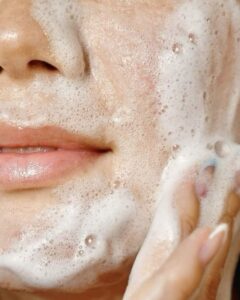
- Cleansers containing aloe vera or colloidal oatmeal, for instance, not only cleanse but also reduce inflammation and restore moisture. This reduces chronic dryness, redness, and flare-ups of eczema while also promoting long-term barrier health.
- Rich in Vitamins, Antioxidants & Hydration
- The fact that natural cleansers offer benefits beyond simple cleaning is another significant benefit. As you wash, the skin is nourished by the abundance of vitamins, minerals, and antioxidants found in many botanicals and plant-based extracts.
- Vitamins A, C, and E—strong antioxidants that fight free radical damage—are found in aloe vera.
- Green tea extract: Rich in polyphenols, it helps prevent inflammation and early aging symptoms.
- Honey is perfect for preserving skin moisture because it is naturally moisturizing and antibacterial.
- Rose water: Reduces redness and irritation while providing hydration.
- Turmeric: Well-known for its antioxidant and whitening compound, curcumin.
- According to experts, the antioxidants found in natural cleansers aid in reducing oxidative stress brought on by UV rays and pollution. Although serums and creams are frequently used to supply vitamins, it adds an additional layer of protection to begin your skincare routine with a cleanser that already contains these nutrients.
- Additionally, humectants like glycerin or hyaluronic acid, which attract water to the skin and keep it hydrated all day, are an ingredient in a lot of natural cleansers. This guarantees that cleansing won’t cause stiffness or flakiness, especially for people with dry or aged skin.
- Suitable for Sensitive and Acne-Prone Skin
- The fact that natural cleansers work well for skin types that are sensitive or prone to acne is arguably the strongest argument for making the transition. Artificial scents and colors, which are frequently the cause of contact dermatitis and allergic responses, are frequently found in conventional cleansers. However, natural treatments steer clear of these irritants and instead use calming herbs like oat extract, calendula, and chamomile.
- Neem, tea tree, and turmeric are natural antibacterial compounds that help acne-prone skin avoid breakouts without the harsh drying effects of pharmaceutical treatments like benzoyl peroxide. Furthermore, rather than totally eliminating sebum, natural cleansers usually preserve oil balance, avoiding the rebound effect, in which the skin creates extra oil to make up for it.
- Additionally, dermatological research indicates that the use of mild, non-comedogenic cleansers lowers inflammation, which is important for the treatment of rosacea, acne, and eczema. For those whose skin responds readily to conventional solutions, this makes using natural cleansers on a daily basis a safer option.
4. Top Natural Cleansers for Everyday Use
4.1 Aloe Vera – The Soothing Hydrator
- How It Calms and Refreshes the Skin
- Known as the “plant of immortality” in ancient Egyptian writings, aloe vera has been used for ages as a natural remedy. Aloe vera’s exceptional skin-soothing qualities are still praised by dermatologists and skincare aficionados today. Aloe vera, when used to cleansers, does more than just wash away debris and pollutants; it also soothes skin irritation, lessens redness, and revitalizes weary skin.
- 99% water and a complex mixture of polysaccharides, amino acids, vitamins A, C, and E, as well as minerals like magnesium and zinc, make up the gel found inside aloe vera leaves. In addition to enhancing the skin’s natural defenses, these ingredients hydrate the skin. The polysaccharides in aloe vera create a thin layer of protective skin that keeps moisture in and stops transepidermal water loss (TEWL).

- According to science, aloe vera includes substances with anti-inflammatory and antibacterial properties such acemannan and aloin.
- According to clinical research, aloe vera can lessen skin irritation brought on by chemical treatments, the sun, and even long-term skin disorders like psoriasis or eczema.
- Aloe vera-based cleansers provide a cooling, refreshing effect that is especially helpful after a long day outside because they simultaneously reduce irritation and provide moisture.
- Aloe vera is a mild yet powerful component of everyday cleansing routines since it naturally promotes the formation of collagen and the healing of wounds.
- It replenishes the skin, leaving it soft, supple, and renewed rather than removing oils.
- Best for Dry & Irritated Skin
- The fact that aloe vera cleansers work well for dry, dehydrated, or irritated skin types is one of their main advantages. Aloe vera aids in restoring equilibrium, in contrast to traditional foamy cleansers that can leave skin feeling tight and dry. Its inherent humectant qualities ensure long-lasting hydration by drawing water into the skin.
- Aloe vera cleansers offer an immediate calming impact, reducing tightness and pain for people with dry skin. Aloe’s fatty acids and vitamin E strengthen the lipid barrier and aid in restoring lost moisture. This eventually avoids irritation and microcracks, which are frequent problems for those who have chronic dryness.
- Aloe vera is one of the best washing substances for sensitive skin because of its mild nature.
- Aloe vera cleansers serve as a natural first-aid measure for skin that is sensitive or inflamed.
- While its antibacterial qualities shield the skin from further infections, the cooling effect offers instant relief from redness and itching.
- Aloe-based creams are frequently suggested by dermatologists as part of a post-treatment regimen following chemical peels, laser therapy, or prolonged sun exposure.
- Its non-comedogenic nature, which means it doesn’t clog pores, is another benefit.
- For those with combination skin, where certain areas of the face may be greasy while others stay dry and sensitive, aloe vera is a flexible choice.
4.2 Rose Water – The Gentle Refresher
- Natural Toner + Cleanser Benefits
- Rose Water Known as the “queen of natural skincare,” rose water has long been a mainstay of beauty in many cultures. Rose water has been prized for its cooling, calming, and attractive properties since Cleopatra’s beauty rituals in ancient Egypt and Ayurvedic and Unani treatment in India. Rose water is a multipurpose daily need in modern skincare since it works as a natural toner and a mild cleanser.
- Rose water works well as a cleanser to remove perspiration, grime, and light makeup without compromising the skin’s natural defenses. Those who prefer a pleasant, non-foaming cleansing in the morning or lunchtime will find it very helpful. Rose water does not deplete the skin of its natural oils, in contrast to harsh soap-based cleansers.
- Rose water works as a toner to refine skin texture and tighten pores. According to dermatological study, phenolic substances with anti-inflammatory and antioxidant properties can be found in rose extracts.
- These limit damage from free radicals, lessen skin irritation, and encourage a more youthful appearance.
- The floral scent also adds a therapeutic element; research on aromatherapy has indicated that rose essence may improve mood and lower stress, which has implications for both emotional and skincare wellness.
- Rose water can be used as a stand-alone refreshing spray throughout the day or as the first step after cleansing, according to many dermatologists.
- Even for skin prone to acne, its lightweight and non-comedogenic properties make it perfect.

- Balancing pH & Reducing Excess Oil
- Rose water’s ability to regulate the skin’s natural pH is one of its most significant skincare benefits. The pH of healthy skin is slightly acidic, ranging from 4.5 to 5.5, which supports the integrity of the barrier and inhibits the growth of dangerous germs. Hard water and popular cleansers, however, frequently upset this equilibrium, leaving skin more vulnerable to dryness, irritation, or breakouts.
- This acidic equilibrium is spontaneously restored by rose water, maintaining the integrity of the skin barrier. For this reason, it is frequently suggested for those with reactive or sensitive skin types who experience tightness after washing, itching, or redness. Rose water helps enhance the absorption of serums and moisturizers by restoring the pH to its ideal level.
- Rose water is revolutionary for skin that is prone to oiliness and acne. Its gentle astringent qualities aid in controlling excessive sebum production without causing excessive dryness. Because of this, it effectively reduces shine while avoiding clogged pores, which can result in acne and blackheads. Its antimicrobial qualities enhance its capacity to treat acne by naturally reducing inflammatory outbreaks.
- In hot and muggy weather, rose water also instantly cools you down. Rose water mist is a great on-the-go cleanser and toner because it cools the skin while also eliminating excess oil and surface pollutants.
4.3 Honey – The Natural Antibacterial Cleanser
- Deep Cleansing Without Stripping Moisture
- Because of its exceptional therapeutic and cosmetic qualities as well as its sweetness, honey has long been regarded as a liquid gold for the skin. Honey washes the skin in a far kinder, more nutritious manner than traditional cleansers, which use potent surfactants to remove oil and grime. Its mild exfoliating sugars and natural enzymes break down dead skin cells, excess oil, and pollutants without weakening the skin’s natural defenses.
- According to science, honey is made up of minerals like potassium and zinc, vitamins (including the B-complex), fructose, glucose, and amino acids. As the skin is cleansed, these nutrients nourish and revitalize it. Above all, honey is a humectant, which means it attracts and holds onto water in the skin.
- Raw and unprocessed honey, especially manuka honey, has been shown in studies to contain strong antibacterial compounds such as methylglyoxal (MGO). These lower the risk of skin infections in addition to combating the bacteria that cause acne. Honey offers a balance between cleansing the face and restoring moisture, in contrast to alcohol-based acne treatments that dry up the complexion.
- Honey also contains natural, moderate acids that aid with gentle exfoliation. Without using physical scrubbing, this encourages skin cell turnover, making the skin appear smoother and more radiant. Honey serves as a mild exfoliator and cleanser in one, making it ideal for daily usage.
- Best for Acne-Prone & Dull Skin
- Honey is especially helpful for people with skin that breaks out easily. Excess sebum, bacterial development, and plugged pores are common causes of breakouts. These problems are immediately addressed with honey:
- Antibacterial Action: Honey helps stop new pimples from forming by lowering Propionibacterium acnes, the bacteria that causes acne.
- Anti-Inflammatory Properties: Cleansers based on honey help red, puffy outbreaks go away more quickly.
- Oil Balance: Honey preserves a healthy balance of oils rather than forcibly removing them, which can lead to the skin producing too much sebum.
- Honey is suitable for oily and combo skin types because it is non-comedogenic, meaning it doesn’t clog pores.
- Honey is suitable for oily and combo skin types because it is non-comedogenic, meaning it doesn’t clog pores.
- Honey acts as a natural brightener for people with weary or lifeless complexion. Its antioxidants combat oxidative stress brought on by pollution and UV rays, and its mild enzymatic exfoliation gets rid of buildup that makes skin appear lifeless. Regular application of honey cleansers can enhance texture and bring back a natural glow over time.
4.4 Cucumber – The Cooling Cleanser
- Hydration + Soothing Properties
- For one straightforward reason, cucumber has gained its reputation as a skincare classic: it is among the most moisturizing and cooling natural ingredients. Cucumber, which has 96% water, is a pleasant beverage for the skin. When added to cleansers, it not only gets rid of dirt and pollutants but also restores moisture that has been lost, leaving the skin feeling refreshed and soft.
- Vitamin C, vitamin K, beta-carotene, and flavonoids are among the vital vitamins and antioxidants that cucumbers contain from a dermatological standpoint. These substances lessen puffiness, alleviate skin irritation, and guard against oxidative stress brought on by environmental harm. Cucumber extracts have been found to have anti-inflammatory qualities, which makes them very useful for reducing mild rashes, redness, and itching.
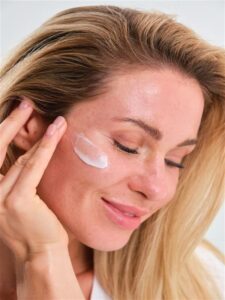
- Additionally, cucumber has a slight astringent effect, which means it naturally tones the skin and tightens pores. For people who desire a refreshing, pore-refining effect without the harshness of alcohol-based toners, this makes it an excellent cleansing ingredient.
- Apart from being calming and hydrating, cucumbers are high in silica, a mineral that promotes skin suppleness and general well-being. For this reason, over time, cleansers made with cucumbers help to preserve a firm, youthful appearance in addition to cleaning.
- Cucumber’s cooling effect is more than simply a nice feeling; it effectively lowers skin temperature, which can be beneficial for sunburn, inflammation, and heat-induced sensitivity. Cucumber-infused cleansers are therefore a great option for those who live in hot or muggy areas.
- Perfect for Summer Skincare
- Summertime presents a special set of skin problems, including excessive oil production, sunburns, plugged pores from perspiration and sunscreen, and chronic dryness. Cucumber-based cleansers are a seasonal necessity in this situation.
- Cucumber keeps the skin hydrated and helps control sebum production in people with oily skin types. Cucumber guarantees moisture while simultaneously eliminating excess oil and pollutants, in contrast to foamy cleansers that may cause the skin to become overly dry.
- Cucumber’s inherent cooling properties offer instant relief for skin that is sensitive or exposed to the sun. Cleansers containing cucumber extract can provide comparable advantages when used on a daily basis, and dermatologists frequently suggest cucumber compresses or gels for sunburn recovery. Additionally, the antioxidant content aids in repairing sun damage and halting UV-induced premature aging.
- Cucumber offers an instant boost to people who feel drained and bored throughout the heat. Its toning and moisturizing properties revitalize drained skin, leaving it feeling more radiant and invigorated. Cucumber is so frequently a main component of face mists and summer skincare products.
- It feels lightweight, which is an additional benefit. Heavy cleansers may feel smothering or sticky on the skin during the summer. In contrast, a cucumber cleanser feels cool and non-greasy, making it suitable for daily use—or even several times a day if necessary.
- Cucumber is also safe and mild, so it can be used on all skin types, including combination, sensitive, and acne-prone skin. A multipurpose summertime essential, it cleanses lightly without compromising the skin barrier.
4.5 Oatmeal – The Gentle Exfoliating Cleanser
- Removes Dirt & Dead Cells Naturally
- Despite its straightforward appearance, oatmeal is a powerful ingredient in skincare products. It has been used in traditional medicine for ages to relieve irritating, itchy, or swollen skin. These advantages are supported by contemporary dermatology, particularly with regards to mild exfoliation and washing.
- The micro-exfoliation that oatmeal offers is different from harsh scrubs that use abrasive particles. Colloidal oatmeal that has been finely powdered absorbs extra oil and attaches itself to the skin’s surface to bind to debris and dead skin cells. It eliminates these contaminants when rinsed away without creating discomfort or little tears. Because of this, oatmeal-based cleansers are especially beneficial for people who require exfoliation but are unable to use scrubs or harsh chemical exfoliants.
- According to science, oatmeal contains saponins, which are natural cleansing agents that, when combined with water, produce a gentle foaming effect.
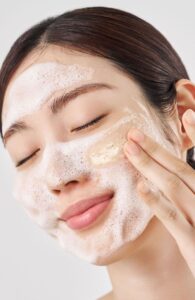
- Best for Sensitive and Eczema-Prone Skin
- The fact that oatmeal works well for dry, sensitive, and eczema-prone skin is what really makes it stand out from other natural cleansers. Because they can exacerbate symptoms, the majority of exfoliants, whether chemical or physical, are not recommended for those with sensitive skin. However, in certain situations, oatmeal has been clinically shown to be both safe and effective.
- To alleviate the itching and irritation brought on by psoriasis, contact dermatitis, or eczema, dermatologists usually suggest colloidal oatmeal baths. Colloidal oatmeal, when added to a cleanser, forms a barrier that protects the skin’s surface from irritants and retains moisture. One of the main problems for people with eczema is water loss, which is lessened by this barrier effect.
- Oatmeal cleansers offer mild comfort for those with sensitive skin without causing flare-ups. Oatmeal reduces inflammation and offers long-lasting moisture, in contrast to foamy cleansers or scrubs that can leave the skin feeling tight and red. Incorporating oatmeal-based cleansers into one’s routine is safe, even for those undergoing skin-fragile procedures like chemical peels, retinol usage, or acne medication.
- Oatmeal does more than merely soothe eczema-prone skin; it actively helps to improve it. According to studies, avenanthramides considerably lessen skin redness and irritation by lowering inflammatory indicators in the skin. Oatmeal meets many demands at once by combining cleansing, exfoliating, and healing.
4.6 Coconut Oil – The Nourishing Cleanser
- Removes Makeup + Moisturizes
- Throughout Asia and the Pacific Islands, coconut oil has long been valued in customary beauty practices. It is praised in contemporary skincare as a natural multipurpose product that can be used as a deep moisturizer and a potent cleanser. Coconut oil easily removes pollutants, makeup, and sunscreen while leaving the skin feeling moisturized and soft, in contrast to traditional cleansers that could contain harsh surfactants or sulfates.
- Its distinct fatty acid content, which is mainly composed of lauric acid, capric acid, and caprylic acid, gives it the potential to cleanse. These not only help break down stubborn makeup and debris but also have antibacterial characteristics that can protect the skin from hazardous microorganisms.
- Unlike alcohol-based removers that strip natural oils and leave the skin tight, coconut oil maintains the skin’s lipid barrier. This is crucial because dryness, irritation, and early aging can result from a compromised barrier. Few natural products can provide your skin with the dual benefits of washing and conditioning in one step like coconut oil does.
- Best for Dry and Mature Skin
- Coconut oil is very helpful for dry and older skin, while it can be used on a variety of skin types. Because of its rich emollient qualities, which seal in moisture, fine wrinkles appear less noticeable and a supple, young texture is encouraged. Dryness is a common result of mature skin’s decreased sebum production. By creating a barrier that stops transepidermal water loss (TEWL), coconut oil makes up for this.
- Furthermore, coconut oil is a great source of antioxidants, particularly vitamin E, which helps against free radical damage and oxidative stress, two major causes of skin aging. Frequent use as a cleanser guarantees that your skin is not only nourished with anti-aging effects but also clean.
- Expert Tip: How to Use Coconut Oil as a Cleanser
- Take one or two tablespoons of cold-pressed, organic coconut oil.
- Use light circular massages on dry skin to help remove pollutants, debris, and makeup.
- Use a cotton pad or a warm, moist microfiber cloth to wipe off.
- For thorough washing, use a gentle, natural water-based cleanser thereafter (particularly if you have oily or mixed skin).
5. How to Choose the Right Natural Cleanser for Your Skin Type
- Selecting a natural cleanser can seem easy, but the formulation can have a significant impact on the health of your skin. Not only should a cleanser eliminate filth, but it should also balance oil production, respect your skin barrier, and nourish your skin type. Let’s examine how to choose the ideal natural cleanser for oily, dry, and sensitive skin because each skin type has unique requirements.

- Oily Skin: Lightweight, Non-Comedogenic Cleansers
- Finding a balance between oil control and skin peeling is difficult if you have oily skin. Natural oils are frequently forcibly removed by harsh cleansers, which exacerbates the issue by encouraging the skin to create more sebum. Choose a natural cleanser that is lightweight, non-comedogenic, and eliminates extra oil without blocking pores instead.
- Aloe vera is calming and balances oil.
- Green tea extract has sebum-regulating and antioxidant qualities.
- Cleaners made of clay, such as bentonite or kaolin, aid in the natural absorption of pollutants and excess oil.
- If you frequently break out, stay away from heavy oils like coconut oil because they might clog your pores. Instead, use natural cleansers that contain jojoba oil, which balances oil production by simulating the skin’s natural sebum.
- Dry Skin: Hydrating, Emollient-Rich Cleansers
- Hydration and nourishment are essential for dry skin. A poor skin barrier that lets water out frequently causes dryness, leaving the skin tight, flaky, and prone to irritation. Emollient-rich, moisturizing natural cleansers are better for dry skin than foamy ones that remove oil.
- The following are ideal ingredients:
- A natural emollient that keeps moisture in while removing makeup is coconut oil.
- Seek out natural cleansers with an oil or cream base that not only cleanse but also repair the skin’s barrier. For people who suffer from dry, flaky spots, a gentle gel cleansing after an oil cleanse can be quite effective.
- Shea butter: it restores dryness and lipids.
- Honey is a naturally occurring humectant that hydrates the skin, making it supple and full.
- Sensitive Skin: Fragrance-Free, Calming Cleansers
- Even some natural essential oils, harsh chemicals, and artificial perfumes can cause severe reactions in sensitive skin. It needs special attention and mild formulas that calm rather than agitate. Selecting soothing, fragrance-free natural cleansers is the best course of action.
- Important components to search for:
- Redness, itching, and flare-ups of eczema are all reduced by oatmeal.
- Chamomile: lessens irritation and inflammation.
- Cucumber cools and moisturizes delicate skin.
- Steer clear of cleansers that contain essential oils like citrus or peppermint, as these might cause discomfort. Use cleansers with fewer ingredients that have been dermatologist-tested for sensitive skin instead.
6. DIY Natural Cleanser Recipes
- Many individuals are turning to safe, natural skincare solutions—ingredients from the garden or kitchen that are mild, efficient, and devoid of chemicals. In addition to saving you from harsh ingredients, DIY natural cleansers enable you to tailor your skincare regimen to your particular requirements. These three tried-and-true natural cleanser formulations are safe, efficient, and supported by both conventional knowledge and recent advancements in dermatology.
6.1 Aloe + Rose Water Daily Face Spritz
- Why it works: Aloe vera is a traditional treatment for reducing redness, moisturizing the skin, and reducing inflammation. It is perfect for everyday usage because it includes polysaccharides that aid in moisture retention. Conversely, rose water functions as a natural toner. It reduces excess oil, balances the pH of the skin, and gives the skin a revitalizing sensation all day.
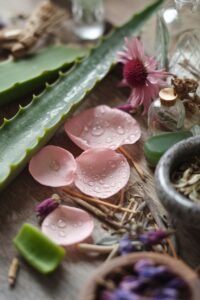
- Recipe:
- Two tablespoons of store-bought or fresh aloe vera gel
- Three teaspoons of rose water, pure
- One teaspoon of glycerin, if desired for further hydration
- Pour the mixture into a spray bottle after mixing the ingredients. Before using, give it a shake, then in the morning and evening, spray it on a clean face.
- Expert Tip: For a cooling, revitalizing effect, especially during warmer weather, keep the spritz in the refrigerator. This is a moisturizing mist that also functions as a cleanser.
6.2 Oatmeal + Honey Gentle Cleanser Paste
- Why it works: Oatmeal contains a lot of saponins, which are organic substances that remove oil and grime without compromising the integrity of the skin’s protective layer. Additionally, it reduces inflammation, which makes it a great choice for skin that is sensitive or prone to eczema. Honey, a natural humectant, has antimicrobial properties that help lower acne-causing germs while also assisting in moisture retention. They combine to form a calming, nourishing cleanser.
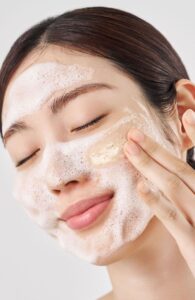
- Recipe:
- Two tablespoons of finely ground oatmeal, preferably colloidal oats
- One tablespoon of unprocessed honey
- A paste can be made with one or two teaspoons of warm water.
- Blend the ingredients until a smooth, spreadable mixture is achieved. Rinse with lukewarm water after applying and gently massaging in circular strokes over damp skin.
- Expert Tip: For further hydration and calming effects, let the paste on for two to three minutes before washing.
7. Expert Tips for Everyday Cleansing
- Cleansing may sound like the simplest part of your skincare routine, but dermatologists emphasize that it’s also the most impactful. Done correctly, cleansing supports skin health by removing dirt, excess oil, and impurities while keeping the protective barrier intact. Done incorrectly, it can trigger dryness, sensitivity, or breakouts. Below are expert-backed tips to help you get cleansing right—every single day.

- Double Cleansing: When & How to Do It
- In order to achieve complete yet delicate cleansing, double cleansing involves using two different kinds of cleansers consecutively. People who wear sunscreen, wear a lot of makeup, or live in polluted areas would especially benefit from it.
- Step 1: Use an Oil-Based Cleanser: An oil cleanser, such as coconut oil or a natural cleansing balm, aids in the removal of excess sebum, sunscreen, and makeup.
- Step 2: Cleaner Based on Water Dirt, perspiration, and residue are guaranteed to be removed using a gentle natural cleanser like aloe vera gel, rose water, or honey.
- Double cleansing is generally advised by experts to be done in the evening rather than the morning. Excessive use might deplete natural oils. Go back to using only one cleanser if your skin feels tight or dry afterward.
- Morning vs. Evening Cleansing Routine
- Dermatologists frequently point out that your skin has different needs at night and in the morning.
- Morning cleansing: Overnight, your skin regenerates, generating perspiration and oils. Refreshing your skin without over-stripping can be achieved using a light natural cleanser, rose water, or cucumber water. Some experts advise rinsing with lukewarm water instead of using a cleanser in the morning for extremely dry or sensitive skin.
- Cleaning in the evening is a must. Your skin is exposed to debris, pollution, and UV radiation throughout the day, which can clog pores and hasten the aging process. It’s important to cleanse thoroughly but gently in the evening, especially if you apply makeup or sunscreen. Double cleansing may work best in this situation.
- Avoiding Over-Cleansing & Skin Barrier Damage
- Overcleaning in the hopes of keeping their skin immaculate is one of the biggest blunders people make. Experts caution that this has the opposite effect. The lipid barrier, the skin’s defense mechanism, is removed by excessive cleaning, which causes irritation, dryness, or rebound oiliness.
- Indications of Excessive Cleaning:
- Dryness or tightness following washing
- Irritation or redness
- Increased outbreaks or flaky areas
- Professional Suggestions:
- Make sure to clean twice a day, in the morning and the evening.
- Because hot water destroys natural oils, use lukewarm water instead.
- Select a natural cleanser that respects your skin’s microbiota and has a pH balance, such as oats or honey.
- Instead of vigorously rubbing, pat dry with a gentle cloth.
FAQS
1. What is the best natural cleanser for everyday use?
The best natural cleanser depends on your skin type. Aloe vera and rose water suit most skin types, while oatmeal and honey are excellent for dry skin, and cucumber or yogurt works well for oily, irritated skin.
2. Can natural cleansers remove makeup effectively?
Yes, natural oils like coconut oil or jojoba oil can break down makeup, sunscreen, and impurities. For heavy makeup, double cleansing (oil + gentle face wash) is recommended.
3. Are natural cleansers safe for sensitive skin?
Most natural cleansers are gentle and safe for sensitive skin, especially fragrance-free ones like oatmeal, honey, or aloe vera. However, always do a patch test before trying a new ingredient.
4. Can I use a natural cleanser every day?
Yes, natural cleansers are typically mild enough for daily use. Consistent cleansing twice a day (morning and evening) helps maintain healthy, balanced skin without stripping moisture.
5. Do natural cleansers help with acne?
Certain natural ingredients like neem, turmeric, honey, and aloe vera have antibacterial and anti-inflammatory properties that can reduce acne breakouts while soothing irritation.
6. Are DIY natural cleansers as effective as store-bought ones?
DIY cleansers like oatmeal-honey pastes or aloe-rose spritzes are effective for gentle cleansing. Store-bought natural cleansers may offer more stability, shelf-life, and enhanced benefits due to added safe preservatives.
7. What should I avoid in a natural cleanser?
Avoid natural cleansers with high concentrations of essential oils, citrus extracts, or abrasive particles (like walnut shells), as they can irritate or damage the skin barrier.
8. How do I know which natural cleanser is right for my skin type?
Oily skin: Lightweight, gel-based, non-comedogenic cleansers.
Dry skin: Hydrating, cream- or oil-based cleansers.
Sensitive skin: Fragrance-free, calming formulas like aloe or oatmeal.
9. Can over-cleansing with natural products damage the skin?
Yes, even natural cleansers can cause dryness or irritation if overused. Limit cleansing to twice daily and avoid harsh scrubbing to protect your skin barrier.
10. Why should I choose a natural cleanser over a chemical one?
Natural cleansers often provide additional nourishment, hydration, and antioxidant protection without harsh sulfates or synthetic fragrances. They respect the skin’s pH and microbiome, making them a safer everyday choice.
